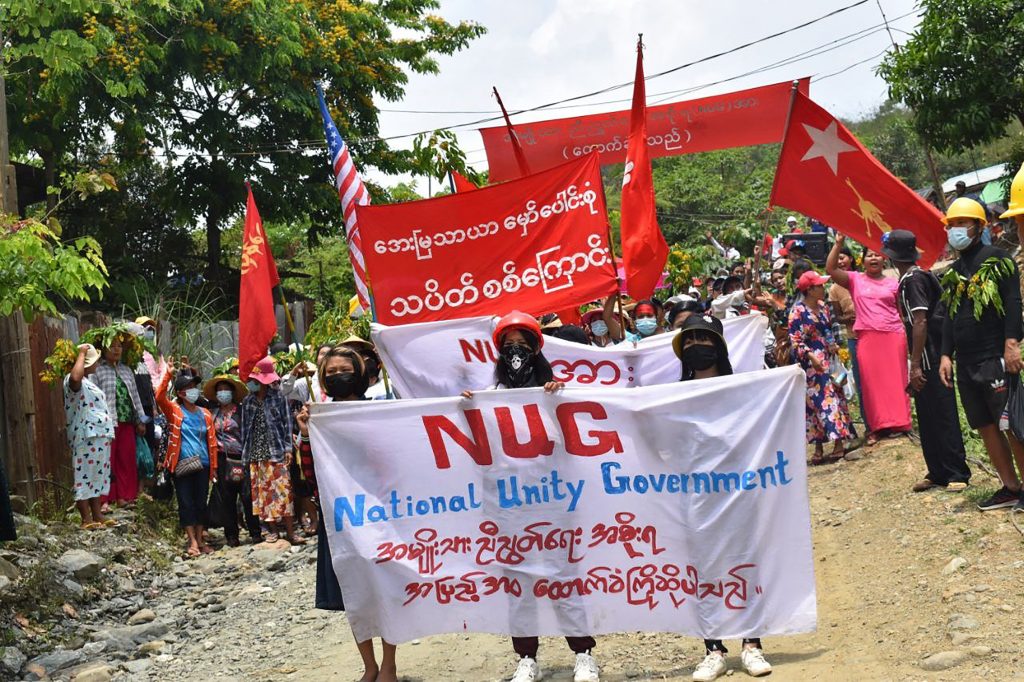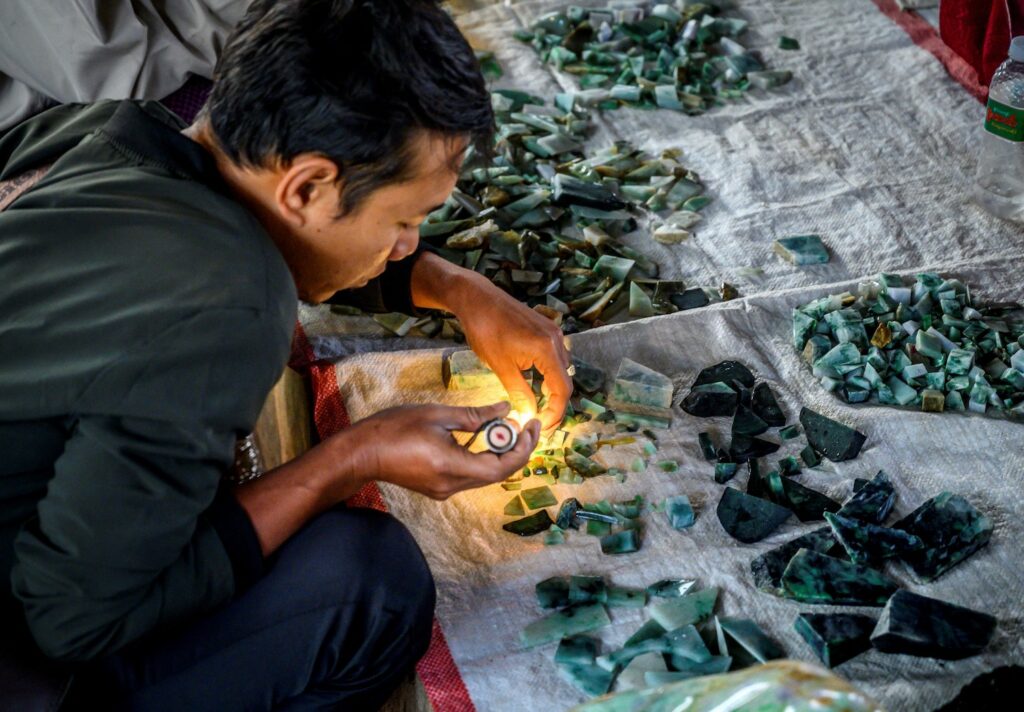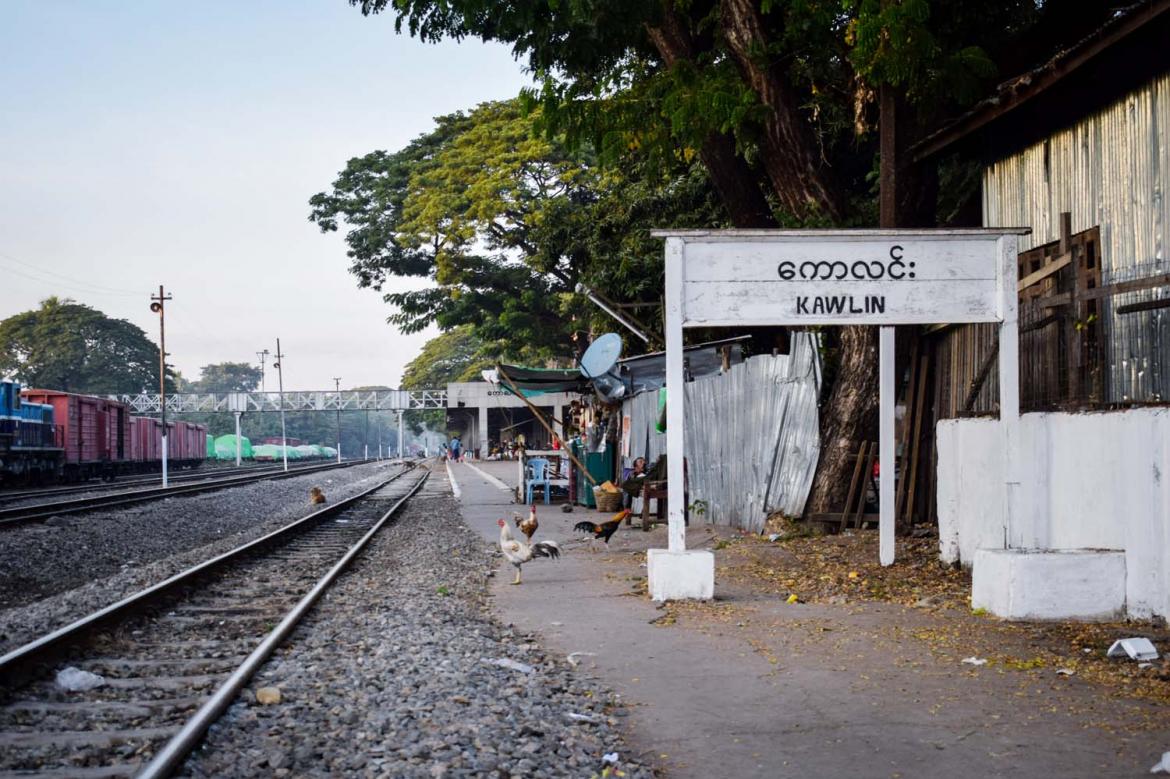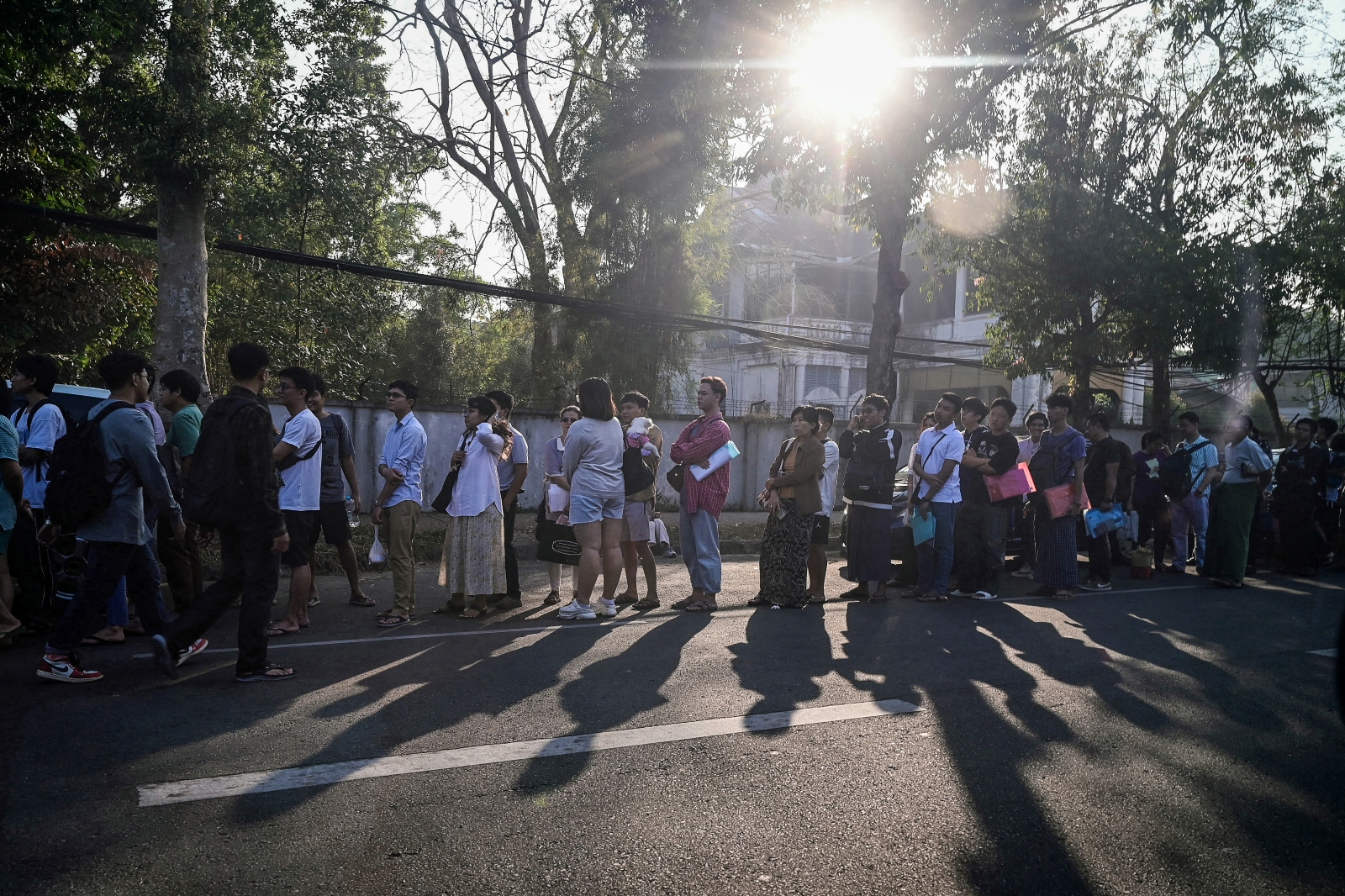While most jade harvested in Myanmar has always been illegally smuggled into China, industry sources say heavy-handed junta policies and political turmoil is further depressing the domestic trade.
By FRONTIER
This month, international buyers were invited to the 58th Gem Emporium in the military-dominated capital of Nay Pyi Taw, the fourth such spectacle held since the military seized power in February 2021.
The previous three fairs had been quiet by past standards, with buyers scared off by the threat of blacklisting or reputational harm. In 2011, Chinese state media trumpeted the US$700 million raised; following the 57th emporium in April this year, the junta’s Global New Light mouthpiece could claim just $15 million.
This time around, Russian buyers were encouraged to attend, as the two isolated regimes find solace in each other’s support. State media boasted of 2,000 jade lots, 330 pearl lots and 120 assorted gem lots put to tender at Nay Pyi Taw’s Mani Yadana Hall, but early reports suggested that not a single ruble was spent.
Merchants from China, on the other hand, had less need to fly to the capital – most of Myanmar’s finest stones make it across the northern border soon after being mined, as the post-coup trade in jade has boomed amid an observable hike in illegal mining.
As the bedazzling array of jewels were being tendered in Nay Pyi Taw, gem merchants in Mandalay told Frontier of their struggle to find standard quality stones in the domestic market because of military intervention and China’s voracious appetite for jade.
Taking back the jewel in the crown
Nearly a year after it seized power, the military’s State Administration Council issued a verbal order in early December 2021 to suspend all mining for jade and gems. The order resulted in most mines halting operations in the ruby-rich Mogok area of Mandalay Region, where there is a strong military presence.
However, the order was largely ignored in the mixed-control Hpakant region of Kachin State, where some of the world’s finest imperial jade is mined, and where the Kachin Independence Army and the military are both active.
Most of the illegally-mined jade, unearthed by operators taking advantage of the unstable political situation, is sent direct to China via the Kanpiketee border gate in Kachin State, a gems trader told Frontier. The domestic jade trade always played second fiddle to smuggling – even pre-coup estimates put the amount of jade smuggled illegally to China at around 80 percent – but insiders say it’s even worse now.
“The order resulted in some mines in Mogok suspending operations, but all of the mines have continued working in Hpakant and the amount of jade smuggled across the border to China has increased,” Ko Myo*, a gems trader and executive committee member of a national gems association, told Frontier.
“Good quality jade and gems have become scarce in the gem market in Mandalay,” he added.
As miners continue to send men into the pits of Hpakant, a series of spoil tip collapses have killed scores of gem pickers in the region since the coup. Environmental groups, drawing from aerial images showing the degradation of rivers and hillsides, have highlighted the significant environmental damage since the coup dismantled even the slightest of regulatory frameworks.
Unmonitored illegal mining and the shipment of high-quality jade to China means that Mandalay’s famous gem market is now limited to inferior quality stones plucked from tailings dumps by scavengers.
“The supply of stones to Mandalay has fallen so badly that a stone that would have fetched about K100 million [US$31,250] at the height of the COVID-19 pandemic is now selling for about K300 million [$93,750]. It is also partly because of the devaluation of the kyat,” a gems trader in Mandalay told Frontier in late September, referring to the almost 150pc slide in the value of Myanmar’s currency against the US dollar since 2020.
“Good quality raw stones rarely come to Mandalay and when they do we have to pay high prices; after cutting and polishing it takes time before they can be sold,” the trader said.
In a June 2021 report, London-based environmental watchdog Global Witness argued that the jade mines and the billions of dollars they generate each year “lie at the heart of a vicious circle of exploitation and conflict that has wracked northern Myanmar for decades and that permeates the political economy of the country”.
The report says that despite an attempt to reform the jade-mining industry launched by the National League for Democracy government after its landslide victory in 2015, vested interests – namely ethnic armed groups and Tatmadaw conglomerates and cronies – opposed reforms, and a lack of government focus left a national gemstone policy stuck in bureaucratic review.
When the NLD government began suspending jade mining licences in 2016, military conglomerate Myanma Economic Holdings Ltd and its subsidiaries held more licences than any other entity in the country, the report said. Most licences were granted to MEHL subsidiaries by the outgoing pro-military Thein Sein government in the first three months of 2016 before the NLD took power, a position the conglomerate only strengthened in the years before the coup.

Conflict stones
A key finding of the report is that the jade mining industry is deeply intertwined with the armed hostilities wracking the country and that jade money finds its way into the coffers of almost every armed actor in Myanmar’s north, including the Tatmadaw, the KIA, the United Wa State Army, the Myanmar National Democratic Alliance Army, and the Arakan Army, as well as smaller militias and Tatmadaw-aligned Border Guard Forces.
This dynamic has since been further convoluted by the formation of popular People’s Defence Forces in opposition to the coup; the security of smaller traders who visit Hpakant’s mines for jade has never been less assured.
“Those who have jade-mining blocks are being squeezed between three forces – ethnic armed groups, the Tatmadaw and now the revolutionary forces, the People’s Defence Forces; they have to be very cautious and diplomatic and try to buy good quality stones from illegal miners. If they become conspicuous, they could be in trouble,” said a jade business owner from Mandalay who requested anonymity.
He said that fighting in Hpakant and the military’s crackdown on traders meant he no longer visits mining areas to collect gems.
The owner was referring to gems tycoon U Kyaw Thura, who was arrested at his home in Mandalay city on August 17 and accused of supporting the National Unity Government, resistance groups in Kachin and Chin states and Magway and Sagaing regions and civil servants partaking in the Civil Disobedience Movement. Kyaw Thura’s possibly forced confession to these accusations was aired by military broadcaster MRTV.
Within days of the arrest, the junta had seized Kyaw Thura’s houses, company offices and workshops in Nay Pyi Taw, Myitkyina and Hpakant, as well as machinery and 193 tons of raw jade, estimated to worth nearly K12 billion ($3.75 million).
The arrest sent shock waves through the industry. Kyaw Thura is vice-chair of the Mandalay Gems and Jewelry Entrepreneurs Association. He owned Myanmar Thura Gems Company, a leading jade miner and the only privately-owned firm directed by a Bamar among the companies at Hpakant, where the industry is dominated by Chinese traders and junta cronies.
A gems business owner said Kyaw Thura was widely respected because of his efforts to develop the sector through value-adding, rather than exporting uncut stones.
“U Kyaw Thura has worked very hard for the development of the jade and gem sector. Nobody could do as much as he did. It is a great setback for the technological development of the gem sector,” the business owner said.

‘All the big players have to behave and be careful’
Another jade and gems market source said that Kyaw Thura’s arrest was intended as a warning.
“Because a man of great financial strength and background connections like U Kyaw Thura has met such a fate, all the other big players have to behave and be careful. They live in constant worry about their safety,” said the source.
At the end of December last year, about 200 Chinese gem traders and Myanmar brokers were arrested in Mandalay for trading gems outside of the city’s famous Jade Market. The arrests also coincided with legal action against gems traders outside of Mandalay, and followed an order from the junta that all transactions on jade take place within the confines of the market under the provisions of the Myanmar Gemstone Act.
The moves are seen by most as an attempt by the military to tighten tax collections on transactions involving precious stones, at a time where it is believed to be struggling to bring in revenue.
The crackdown dissuaded gems traders from operating outside of the jade market, and most now stay within its walls to do business, said Ko Myo the gems trader. At the time of the crackdown, troops had threatened to “shoot dead” anyone trading gems outside of the permitted area.
“Even buyers from China now enter the market in Mandalay to buy jade,” Ko Myo added.
However, attracting Chinese buyers to Mandalay became impossible between June and August after China closed the border with Myanmar as part of its zero COVID-19 policy.
“The gems market in Mandalay is connected to the Kyegaung market in China’s Yunnan Province,” he said, referring to a market in China’s Ruili, opposite Muse in Shan State. “COVID-19 was detected there about two months ago and it was locked down, which affected business at the Mandalay market. However, the lockdown at Kyegaung has been lifted, so the gems trade in Mandalay has been more active since early October,” he said.
But those attending to business in Mandalay represent just a fraction of Myanmar’s total trade in gems – the Global Witness report estimates that about 90pc of jade mined at Hpakant is smuggled across the border.
“Jade from Hpakant does not come to the Mandalay market. There are many Chinese buyers at the Hpakant mines and they take the jade directly to China. There is only low quality jade collected by scavengers on the local market; you can guess where the quality stones go,” said a gems trader who requested anonymity.
Market sources said the order from the military to suspend all jade and gems mining had not been completely effective, and that one outcome had been to encourage more illegal mining and trading.
Last year, local media outlets reported that mining companies had increased operations at Hpakant’s mines by bribing military officials and local Kachin authorities charged with overseeing the area. Operators were given advance warnings when inspectors from the junta-controlled Ministry of Mines arrived to check that bans were being upheld, giving them time to hide their machinery.
“Instructions, orders and laws are issued in offices in Nay Pyi Taw, but they are not effective,” said Ko Myo.
* denotes the use of pseudonym for safety reasons







